Personal library: information etiquette, preparation for large projects, lean manufacturing, space exploration
Redmadrobot Development Director Max Voloshin compiled the top 5 useful books - for personal and business efficiency. And also for lovers of quality science fiction.
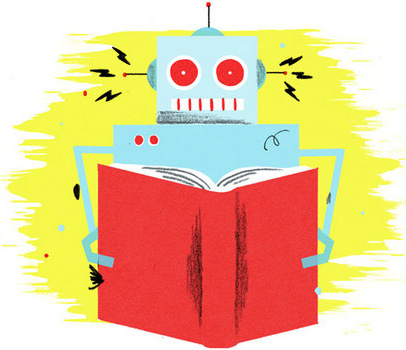
Roland Huntford “Conquering the South Pole. Race of Leaders ”
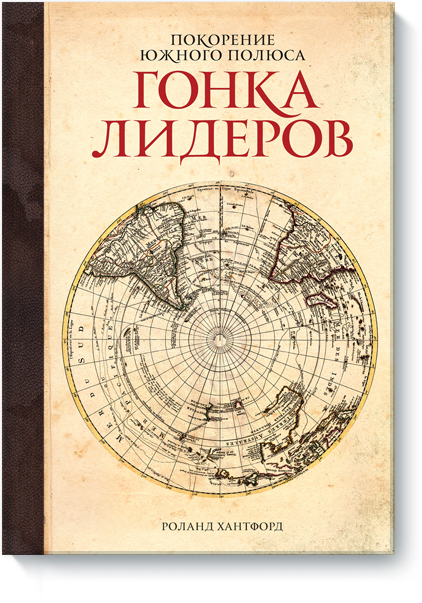
In “Conquering the South Pole” two life paths are described that are completely different in temperament and upbringing: the Norwegian Amundsen and the British Scott. The narration is sometimes tedious, but on the whole it reveals well the formation of each of the travelers before the start of the struggle for the South Pole and already in detail, through diary entries, shows the process of the race itself. The problems of team formation and work in it are examined in great detail. Roland Huntford, the author of the book, focuses on this topic and analyzes it from different points of view: his, Scott and Amundsen. It turns out a kind of express-course psychological preparation of Star City.
I have already said that keeping a diary is extremely useful. Why did polar explorers keep logs even at the planning stage of expeditions? To preserve and comprehend the most valuable practical experience.
For those who are building their own business or working on projects within already established businesses, reading “Conquering the South Pole” will be especially interesting. The book perfectly “includes the head”: you begin to see very clearly your own weaknesses and think about how to deal with them further.
The main idea: you should not neglect the opportunity to learn from your own and others' experience, it is critically important for effective movement towards truly great goals.
Andy Weyer “The Martian”
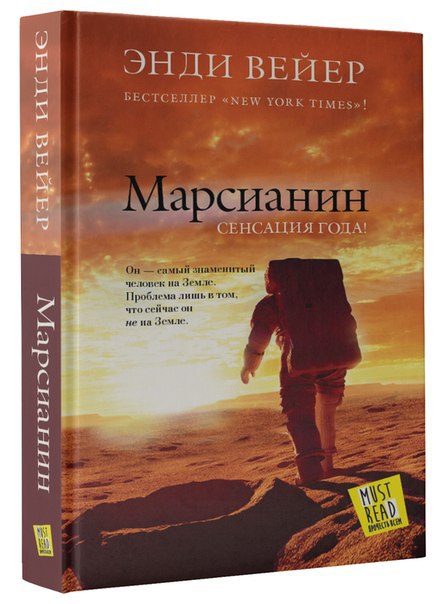
The author is an American programmer, a fan of science fiction. He is fond of space and solar planet development programs. “Martian” is, on the one hand, a classic science fiction novel with a large number of figures, a real scientific base and an explanation of how to make water from hydrogen fuel. On the other hand, this is a fascinating read about Robinson Crusoe of the 21st century - a man who was left on Mars and who could not only survive, but also maintain a great sense of humor. A book about willpower, problem solving and planning, such planning, on which life depends not only on the deadline or a reduced margin, which has moved away for a couple of weeks, but on life. Well, the diary style of presentation on behalf of the protagonist is a good example of the practical application of reflection: without pens, to achieve a result. In general, this is an excellent mix of the book “Conquering the South Pole. Race of Leaders ”and the film“ Gravity ”.
Henry Ford “My Life, My Achievements”

The book is a description of the first steps of the scientific organization of labor and a kind of introduction to lean manufacturing. Some topics suspiciously have something in common with “Atlas Shrugged” by Ain Rand, especially about money, which is primarily a measure of labor, and not a source of income, and about the importance of industry in the development of the country, and the world in general. The main idea of the book of Ford is that the company must be profitable if it produces a truly useful product or provides a useful service of high quality at an attractive price. But on the path to profitability is the imperfection of business processes and management, which is a source of unnecessary costs of time, material and human resources, through which all profit flows. To prevent this from happening, it is necessary to decompose the business, analyze all production flows, both informational and material, describe them, put them into a system,Root Cause Analysis ) and the mechanism for their subsequent modification. It was important for Ford 100 years ago, but it is relevant for us now.
And most importantly: work should be a matter of life, and not just a source of money in order to spend it in the evening on rest from work. Work is not only an opportunity for personal development, but also an opportunity to change the world. It is incredibly stupid to neglect this.
Mark Hurst “Do not cook the pot! How to curb the endless stream of letters and tasks ”
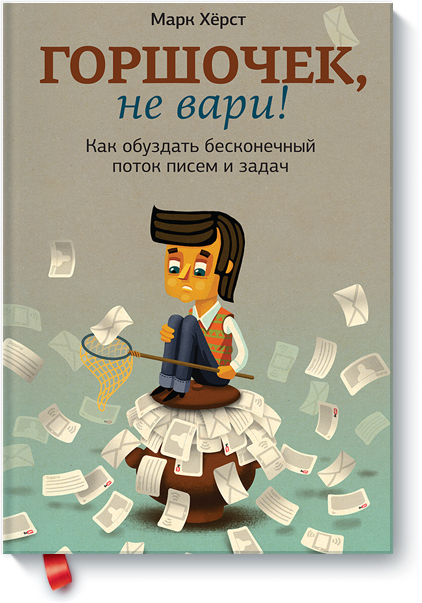
This book is about information etiquette or even more accurately will say - information hygiene. Hurst, a specialist in personal productivity and IT consulting, sets out in detail the principles of working with mail (approach to writing letters), strategic tasks, storing data and organizing the flow of information channels that multiply exponentially. The author promotes the principle of “zero Inbox”: mail is not a bottomless repository of text junk, it is an important communication tool for receiving and sending information. For arrangements, materials and tasks there are special tools. A separate topic is postal etiquette aimed at respecting other people's time. How to defeat redundancy and convey the message as clearly as possible, quickly and “directly to the head” of the addressee. Such a light version of the "Minto Pyramid Principle". In general, the book is good to tune your systems, add useful updates to them.
Mike Rowdy Visual
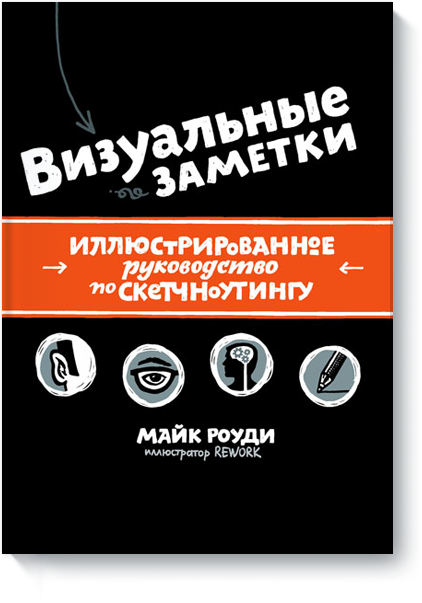
Mike Rody - UX / UI Designer and Illustrator. At some point, he decided to adapt and extend his graphic experience to areas far from design. For those who have not yet used sketching in recordings, this book is a good first step. For those who use, there are interesting finds, for example, a personal visual library (own style guide). It is read very easily (in a few hours), well structured, excess information is practically absent. Rowdy, by the way, has an interesting personal blog .

Roland Huntford “Conquering the South Pole. Race of Leaders ”

In “Conquering the South Pole” two life paths are described that are completely different in temperament and upbringing: the Norwegian Amundsen and the British Scott. The narration is sometimes tedious, but on the whole it reveals well the formation of each of the travelers before the start of the struggle for the South Pole and already in detail, through diary entries, shows the process of the race itself. The problems of team formation and work in it are examined in great detail. Roland Huntford, the author of the book, focuses on this topic and analyzes it from different points of view: his, Scott and Amundsen. It turns out a kind of express-course psychological preparation of Star City.
I have already said that keeping a diary is extremely useful. Why did polar explorers keep logs even at the planning stage of expeditions? To preserve and comprehend the most valuable practical experience.
For those who are building their own business or working on projects within already established businesses, reading “Conquering the South Pole” will be especially interesting. The book perfectly “includes the head”: you begin to see very clearly your own weaknesses and think about how to deal with them further.
The main idea: you should not neglect the opportunity to learn from your own and others' experience, it is critically important for effective movement towards truly great goals.
Andy Weyer “The Martian”

The author is an American programmer, a fan of science fiction. He is fond of space and solar planet development programs. “Martian” is, on the one hand, a classic science fiction novel with a large number of figures, a real scientific base and an explanation of how to make water from hydrogen fuel. On the other hand, this is a fascinating read about Robinson Crusoe of the 21st century - a man who was left on Mars and who could not only survive, but also maintain a great sense of humor. A book about willpower, problem solving and planning, such planning, on which life depends not only on the deadline or a reduced margin, which has moved away for a couple of weeks, but on life. Well, the diary style of presentation on behalf of the protagonist is a good example of the practical application of reflection: without pens, to achieve a result. In general, this is an excellent mix of the book “Conquering the South Pole. Race of Leaders ”and the film“ Gravity ”.
Henry Ford “My Life, My Achievements”

The book is a description of the first steps of the scientific organization of labor and a kind of introduction to lean manufacturing. Some topics suspiciously have something in common with “Atlas Shrugged” by Ain Rand, especially about money, which is primarily a measure of labor, and not a source of income, and about the importance of industry in the development of the country, and the world in general. The main idea of the book of Ford is that the company must be profitable if it produces a truly useful product or provides a useful service of high quality at an attractive price. But on the path to profitability is the imperfection of business processes and management, which is a source of unnecessary costs of time, material and human resources, through which all profit flows. To prevent this from happening, it is necessary to decompose the business, analyze all production flows, both informational and material, describe them, put them into a system,Root Cause Analysis ) and the mechanism for their subsequent modification. It was important for Ford 100 years ago, but it is relevant for us now.
And most importantly: work should be a matter of life, and not just a source of money in order to spend it in the evening on rest from work. Work is not only an opportunity for personal development, but also an opportunity to change the world. It is incredibly stupid to neglect this.
Mark Hurst “Do not cook the pot! How to curb the endless stream of letters and tasks ”

This book is about information etiquette or even more accurately will say - information hygiene. Hurst, a specialist in personal productivity and IT consulting, sets out in detail the principles of working with mail (approach to writing letters), strategic tasks, storing data and organizing the flow of information channels that multiply exponentially. The author promotes the principle of “zero Inbox”: mail is not a bottomless repository of text junk, it is an important communication tool for receiving and sending information. For arrangements, materials and tasks there are special tools. A separate topic is postal etiquette aimed at respecting other people's time. How to defeat redundancy and convey the message as clearly as possible, quickly and “directly to the head” of the addressee. Such a light version of the "Minto Pyramid Principle". In general, the book is good to tune your systems, add useful updates to them.
Mike Rowdy Visual

Mike Rody - UX / UI Designer and Illustrator. At some point, he decided to adapt and extend his graphic experience to areas far from design. For those who have not yet used sketching in recordings, this book is a good first step. For those who use, there are interesting finds, for example, a personal visual library (own style guide). It is read very easily (in a few hours), well structured, excess information is practically absent. Rowdy, by the way, has an interesting personal blog .
